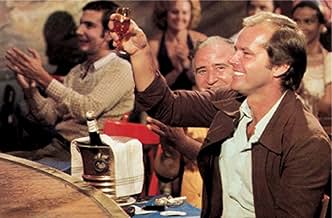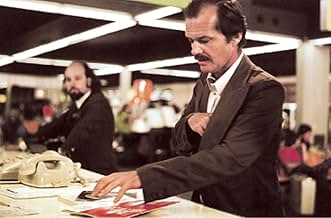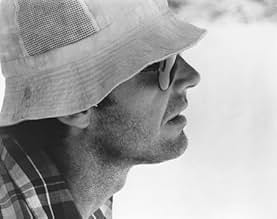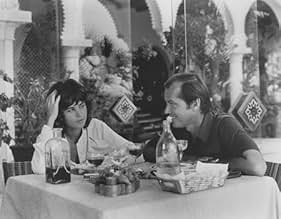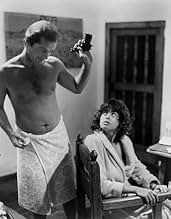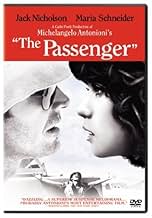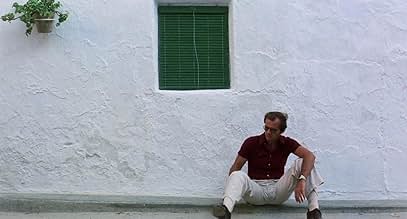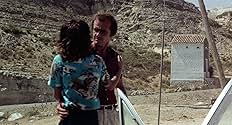Un corresponsal de guerra frustrado, incapaz de acercarse a la guerra que debe cubrir, decide apropiarse de la identidad de un conocido traficante de armas muerto.Un corresponsal de guerra frustrado, incapaz de acercarse a la guerra que debe cubrir, decide apropiarse de la identidad de un conocido traficante de armas muerto.Un corresponsal de guerra frustrado, incapaz de acercarse a la guerra que debe cubrir, decide apropiarse de la identidad de un conocido traficante de armas muerto.
- Premios
- 5 premios ganados y 2 nominaciones en total
- Robertson
- (as Chuck Mulvehill)
- Hotel Clerk
- (sin créditos)
- Murderer's accomplice
- (sin créditos)
- Cameraman
- (sin créditos)
Argumento
¿Sabías que…?
- TriviaWhen Michelangelo Antonioni received his honorary Oscar in 1995, the Academy asked Jack Nicholson to present it to him.
- ErroresThere are a couple of inaccuracies in the displayed details of Locke's Air Afrique air ticket that was evidently issued in Douala, Cameroon in August 1974. The name of Fort-Lamy (Chad's neighboring capital city) became N'djamena in early 1973, and Paris is written in Italian ("Parigi") which would not have occurred in French-speaking Douala.
- Citas
The Girl: Isn't it funny how things happen? All the shapes we make. Wouldn't it be terrible to be blind?
David Locke: I know a man who was blind. When he was nearly 40 years old, he had an operation and regained his sight.
The Girl: How was it like?
David Locke: At first he was elated... really high. Faces... colors... landscapes. But then everything began to change. The world was much poorer than he imagined. No one had ever told him how much dirt there was. How much ugliness. He noticed ugliness everywhere. When he was blind... he used to cross the street alone with a stick. After he regained his sight... he became afraid. He began to live in darkness. He never left his room. After three years he killed himself.
- Créditos curiososLeo, the MGM lion, which normally precedes the opening credits of MGM movies, has been supplanted by "BEGINNING OUR NEXT 50 YEARS". Leo then returns in the center with "GOLDEN ANNIVERSARY" on either side of it.
- Versiones alternativasSeven minutes were added to the 2005-2006 re-release version, including a brief shot of a nude Maria Schneider in bed with Jack Nicholson in the Spanish hotel.
- ConexionesFeatured in Z Channel: A Magnificent Obsession (2004)
Directed by Michelangelo Antonioni and written alongside Mark Peploe and Peter Wollen, 'The Passenger' is an intriguing, atmospheric drama exploring the complexities of truth, identity and isolation. It is a subtle, low-key film that doesn't rely on garrulous dialogue to forward the narrative, and is open to interpretation in many ways. Antonioni strikes a perfect balance between visual and oral storytelling, using Locke's journey to contemplate the impermanence of identity, the mysteries of truth and the devastation of alienation. Though Locke escapes from his unfulfilling life, he cannot run from his past. Nor can he escape the past associated with his new identity, or the fate attached to it.
Here, one could say that Antonioni is suggesting that identity is not something one can easily define or control, but rather something that one has to constantly negotiate and question. He uses Locke's story to posit that identity is not necessarily a source of meaning or fulfilment, but rather one of confusion and alienation. Furthermore, the alienation Locke feels is not just with his environment and with those around him, but with himself. He struggles throughout the film with his sense of purpose, and only by embracing his alienation does he find a potential source of new perspectives and experiences. In this way, Antonioni shows how alienation can positively affect one's life.
Additionally, the notions of truth and reality being stable and fixed concepts are put to question, as every character in the film is involved in a lie, in one way or another. The world of 'The Passenger' is one riddled with contradictions and uncertainties, in terms of perception and beliefs. The film shows us that truth is elusive, and not necessarily a source of clarity or certainty, but rather one of befuddlement and melancholy. As is the case with the themes of identity and alienation, Antonioni's exploration of truth and reality is one that feels consistently fresh and intriguing throughout 'The Passenger'; making its narrative one that you'd be hard pressed to forget.
Despite this depth and complexity of narrative, it is the cinematography that is the real draw here, which is epic and atmospheric. Luciano Tovoli's utilisation of long takes and natural lighting creates a realistic and immersive style contrasted with the alienating world Locke finds himself in. His artful framing and composition carries symbolic, expressive meanings- such as the use of windows and mirrors to create frames within frames, suggesting Locke's entrapment and isolation.
Tovoli also makes excellent use of zooms, pans, tilts and tracking shots to create dynamic and fluid transitions between spaces and perspectives, mirroring Locke's search for truth and identity. His handling of a seven-minute tracking shot at the end of the movie is particularly breath-taking; perhaps one of the finest such sequences ever put to film. This intense scene acts as a metaphor for Locke's journey, as well as creating a contrast between the realistic and symbolic, challenging our perception and understanding of reality, as it shows us things that are not possible or logical.
Through its use of long takes, deep focus and natural lighting- creating a modernist, minimalist aesthetic that reflects the characters' alienation- the film is reminiscent of Antonioni's previous 'L'Avventura' trilogy; though in colour and on location. Conversely, some may compare the visual aesthetics to those of Yasujiro Ozu or Robert Bresson, who used natural lighting to generate a realistic and contemplative style that explored the human condition in a profound, assured way. Whatever the case, the cinematography of 'The Passenger' is arguably its greatest strength, enhancing the film's themes and narrative by creating a contrast between the realistic and the symbolic; while always remaining visually stunning.
'The Passenger' stars Jack Nicholson as Locke, delivering a measured performance that rivals his similarly understated efforts in 'The King of Marvin Gardens' and 'Five Easy Pieces.' From his opening moments- trapped in the desert unable to communicate with anyone- to his last, Nicholson mesmerizes. Consistently underplaying it, he never sets a foot wrong performance-wise, sharing an easy chemistry with co-star Maria Schneider that makes watching them together a real treat. For her part, Schneider brings a light touch to proceedings and- though her role is a little underwritten- shines throughout; leaving an indelible impression on the viewer.
Having said all that, if you don't appreciate abstract, existentialist films, or narratives that are open to interpretation and draped in mystery and intrigue; 'The Passenger' may not be for you. It is a complex film that doesn't clearly or definitely state its intentions or explain its meanings. Beautifully shot and strongly acted, 'The Passenger' examines some profound themes in a mature, understated way, and is a highlight of Antonioni's oeuvre. If you do appreciate the abstract, the mysterious and the profound, then hop on board 'The Passenger': it's one hell of a ride.
Selecciones populares
- How long is The Passenger?Con tecnología de Alexa
Detalles
- Fecha de lanzamiento
- Países de origen
- Sitio oficial
- Idiomas
- También se conoce como
- The Passenger
- Locaciones de filmación
- Fort Polignac, Algeria(desert scenes, setting: Chad)
- Productoras
- Ver más créditos de la compañía en IMDbPro
Taquilla
- Total en EE. UU. y Canadá
- USD 620,155
- Fin de semana de estreno en EE. UU. y Canadá
- USD 24,157
- 30 oct 2005
- Total a nivel mundial
- USD 769,503
Contribuir a esta página




